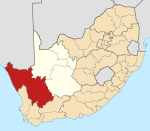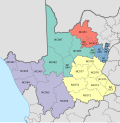Kamiesberg Local Municipality: Difference between revisions
m NeilN moved page Kamiesberg to Kamiesberg Local Municipality without leaving a redirect: arrgh, restore |
Rescuing 1 sources and tagging 0 as dead. #IABot (v1.3beta8) |
||
| Line 18: | Line 18: | ||
| parts_type = [[Ward (South Africa)|Wards]] |
| parts_type = [[Ward (South Africa)|Wards]] |
||
| parts = 4 |
| parts = 4 |
||
| government_footnotes = <ref name="muni_mayor">{{cite web |
| government_footnotes = <ref name="muni_mayor">{{cite web|url=http://www.gcis.gov.za/gcis/gcis_list.jsp?id=14&heading=Executive%20Mayors |title=Contact list: Executive Mayors |publisher=Government Communication & Information System |accessdate=22 February 2012 |deadurl=yes |archiveurl=https://web.archive.org/web/20100714013749/http://www.gcis.gov.za/gcis/gcis_list.jsp?id=14&heading=Executive+Mayors |archivedate=14 July 2010 |df= }} </ref> |
||
| mayor_party = |
| mayor_party = |
||
| mayor = Martin Klasae |
| mayor = Martin Klasae |
||
Revision as of 19:51, 1 May 2017
Template:Infobox South African municipality Kamiesberg Local Municipality is in South Africa.
Population
In 2007 an estimated 12,117 persons lived in Kamiesberg;[1] however, this estimate is very rough. The majority of Kamiesberg's people are coloured (mixed race).
Kharkams village represents, in many ways, the typical village in Kamiesberg: the average education level is 6.7 years; electricity reached the village in 1999; water is available in nearly every house; villagers have access to health care once a week.
Sheep and goats are kept on villager-owned land between Kamiesberg's eleven villages.
Topography and climate
Kamiesberg municipality spans three topographic zones. The area stretches from the sandy coastal lowlands (Sandveld) to the mountainous central Kamiesberg escarpment (Hardveld), and to the eastern plateau of Bushmanland. There are no perennial rivers in the area. Water is obtained from subterranean sources. Some of the water is pumped up by windmills, but most of the water to the communal areas is from natural springs. Many of these springs are semi-perennial, and the salt content of the water can vary from year to year, causing problems. In 2003 the rainfall was 131 mm (5 in) in Springbok (100 km (62 mi) north of Kamiesberg). Rainfall has on average decreased from 1970 to 1994.
Soils and vegetation
Four main types of vegetation are found in the area: Mountains Renosterveld, Succulent Karoo, False Succulent Karoo and Namaqualand Broken Veldt. However, overall plant life is in a deteriorating state, and non-edible, undesirable and poisonous vegetation is taking over.
Sources of household income in Kamiesberg
A survey (2003) of three communal villages in Kamiesberg (only 74 saailande owners) showed the following sources of household income: wage labour (49%), government transfers (28%), small business (11%), remittances (6%), livestock income (3%) and farm income (3%).
Communal institutions
Like every other municipality in Namaqualand, Kamiesberg is governed by formal institutions. The most important formal institutions are: Kamiesberg Municipality located in Garies, the Common Management Committee (Meentcommetee), the Old Local Council and Transitional Local Councils (TLCs).
Main places
The 2011 census divided the municipality into the following main places:[2]
| Place | Code | Area (km2) | Population |
|---|---|---|---|
| Garies | 365016 | 69.4 | 2,105 |
| Hondeklip Bay | 365009 | 22.7 | 543 |
| Kamassies | 365001 | 0.9 | 341 |
| Kamieskroon | 365007 | 8.8 | 893 |
| Karkams | 365011 | 30.3 | 1,439 |
| Kheis | 365014 | 0.9 | 488 |
| Klipfontein | 365015 | 0.8 | 466 |
| Koingnaas | 365005 | 46.9 | 105 |
| Leliefontein | 365008 | 0.7 | 616 |
| Lepelsfontein | 365017 | 28.7 | 233 |
| Nourivier | 365006 | 0.3 | 460 |
| Paulshoek | 365013 | 0.7 | 415 |
| Rooifontein | 365003 | 0.7 | 332 |
| Soebatsfontein | 365004 | 0.4 | 276 |
| Spoegrivier | 365010 | 0.3 | 513 |
| Tweerivier | 365012 | 0.3 | 252 |
| Remainder | 365002 | 13,997.5 | 709 |
| Total | 14,210.2 | 10,187 | |
Politics
The municipal council consists of seven members elected by mixed-member proportional representation. Four councillors are elected by first-past-the-post voting in four wards, while the remaining three are chosen from party lists so that the total number of party representatives is proportional to the number of votes received. In the election of 18 May 2011 the African National Congress (ANC) won a majority of four seats on the council. The following table shows the results of the election.[3][4]
style="width: 2px; color:inherit; background-color: #006600;" data-sort-value="African National Congress" | style="width: 2px; color:inherit; background-color: #005BA6;" data-sort-value="Democratic Alliance (South Africa)" | style="width: 2px; color:inherit; background-color: #FFCA08;" data-sort-value="Congress of the People (South African political party)" || Party | Votes | Seats | ||||||
|---|---|---|---|---|---|---|---|---|
| Ward | List | Total | % | Ward | List | Total | ||
| ANC | 2,701 | 2,705 | 5,406 | 54.3 | 2 | 2 | 4 | |
| DA | 1,705 | 1,719 | 3,424 | 34.4 | 2 | 0 | 2 | |
| COPE | 572 | 548 | 1,120 | 11.3 | 0 | 1 | 1 | |
| Total | 4,978 | 4,972 | 9,950 | 100.0 | 4 | 3 | 7 | |
| Spoilt votes | 72 | 72 | 144 | |||||
References
- ^ Municipal Demarcation Board South Africa
- ^ "Kamiesberg Local Municipality". Census 2011.
- ^ "Results Summary – All Ballots: Kamiesberg" (PDF). Independent Electoral Commission. Retrieved 24 November 2013.
- ^ "Seat Calculation Detail: Kamiesberg" (PDF). Independent Electoral Commission. Retrieved 24 November 2013.


